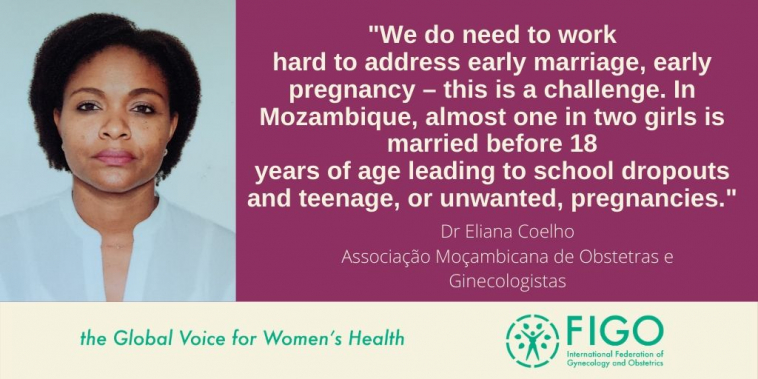Women's Health is a Priority in Mozambique
We hear from Dr Coelho on adolescent and women's health, and challenges to achieving Generation Equality in Mozambique.

My greatest joy as an obstetrician in Mozambique is that I can speak to and treat women and girls every day.
I also have the opportunity to speak with young women and adolescents. I especially enjoy building relationships with girls, discussing their health needs including family planning, giving them the skills to be stronger about their own sexual reproductive health and rights and what they can do to keep them in school.
When I speak with a girl, I do not only provide medical care, I also provide empathy. She knows that she can come to me, to call me, when she needs something.
There can be strength in being able to have children. I enjoy providing prenatal consultations and safely delivering babies. Sometimes we are so focused on delivery, what is most important to me is when mother and baby go home safely together.
It is very good when mama and child both go home together.
Women’s health issues in Mozambique
I think women’s health and rights is a high priority in Mozambique, but the problem is the lack of funding for programmes.
We have seen success; maternal mortality has declined. Something is starting.
In 2017, Associação Moçambicana de Obstetras e Ginecologistas (AMOG) began visiting district health centres and mentoring health workers on pre-natal care, how best to deal with haemorrhage, sepsis and preeclampsia. We also worked with AMOP, who focus on paediatrics, and mentored them on quality care for both woman and child. This mentoring is still an important activity for our association.
The decision as to how many children to have does not belong to the woman. When discussing their reproductive health needs, a response I hear often is “I will ask my husband”. Sometimes the woman has to call to the husband for the decision. This is a challenge; women are not comfortable to make their own decisions.
I want to discuss post-partum family planning when she visits for prenatal care, so that when she reaches maternal delivery she has made this decision already. It’s not because the woman does not know what she wants, sometimes she does not hear about the options until after delivery. I have heard women say “you can put in the device, but do not tell my husband”.
As a country, we need to do more. But, I think something is being done.
Challenges to achieving generation equality
There is still a big challenge in access to education in Mozambique. Sometimes education for girls is lacking and she is unable to learn the skills. There is still a part of the population that does not read, so it can be difficult for a girl to have the information. In a big city like Maputo it is easier, but if you look at the rural areas you will find bigger challenges.
We even have a Minister of Education, it is a good principal and we now have a good opportunity to address this. The government is trying to offer free education for all up to year 9 (it was formerly year 7).
Vision for the future of women’s health in Mozambique
We do need to work hard to address early marriage, early pregnancy – this is a challenge. In Mozambique, almost one in two girls is married before 18 years of age leading to school dropouts and teenage, or unwanted, pregnancies.
The government approved and implemented the National Strategy for Preventing and Combating Earlier Marriages 2016-2019, which has now been transformed into a public agenda.
I think things are going well. I think the future will be good.